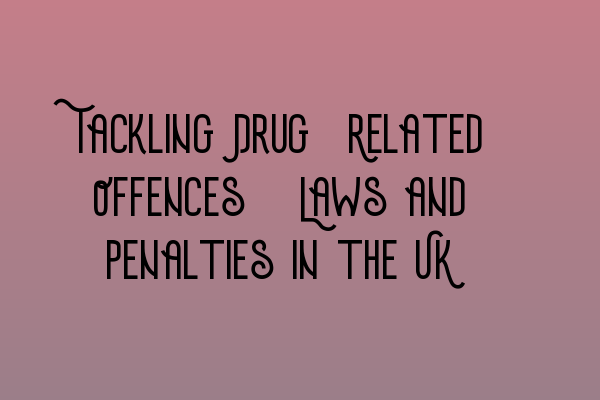Tackling Drug-Related Offences: Laws and Penalties in the UK
Drug-related offences are serious crimes that have a significant impact on individuals and communities. In the UK, the laws and penalties surrounding drug offences are strict in order to combat the widespread use and distribution of illicit substances. This blog post will provide an overview of the laws and penalties related to drug offences in the UK.
Laws Regarding Drug Offences
The Misuse of Drugs Act 1971 is the primary piece of legislation that governs drug offences in the UK. This act categorizes drugs into three classes: Class A, Class B, and Class C. The classification is based on the potential harm and misuse of the substances.
Class A drugs include substances such as heroin, cocaine, and ecstasy. The penalties for possession, supply, and production of Class A drugs are the most severe. Class B drugs, such as cannabis and amphetamines, carry lesser penalties, while Class C drugs, like anabolic steroids and certain tranquilizers, have even lower penalties.
It is important to note that the penalties for drug offences can vary depending on the specific circumstances of the case, including the quantity of drugs involved, intention to supply, and previous convictions.
Penalties for Drug Offences
The penalties for drug offences in the UK range from fines to imprisonment, depending on the severity of the crime. Here is a breakdown of the potential penalties for different drug-related offences:
Possession of Drugs
Possession of drugs for personal use is a criminal offence. The penalties for drug possession can include a fine, a community order, or up to seven years in prison, depending on the class of the drug.
Supplying Drugs
Supplying drugs, whether it is sharing with friends or selling to others, is a more serious offence. The penalties for drug supply can range from a fine to life imprisonment, depending on the class and quantity of drugs involved.
Production of Drugs
The production or cultivation of drugs is a highly illegal activity. The penalties for drug production can include a fine, a lengthy prison sentence, or even life imprisonment, depending on the class and scale of the operation.
Seeking Legal Advice
If you or someone you know is facing drug-related offences, it is crucial to seek legal advice from a qualified criminal solicitor. They can help navigate the complexities of the law and provide guidance throughout the legal process.
Related Articles:
- SQE 1 Practice Exam Questions
- SQE 1 Practice Mocks FLK1 FLK2
- SQE 2 Preparation Courses
- SQE 1 Preparation Courses
- SRA SQE Exam Dates
Knowing your rights and having expert legal representation can make a significant difference in the outcome of drug-related offence cases.
In conclusion, drug-related offences carry serious penalties in the UK. The Misuse of Drugs Act 1971 categorizes drugs into three classes and sets out the penalties for possession, supply, and production of these substances. Seeking legal advice from a criminal solicitor is crucial if facing drug-related charges. Remember, understanding the law and having the right legal support can make all the difference.
